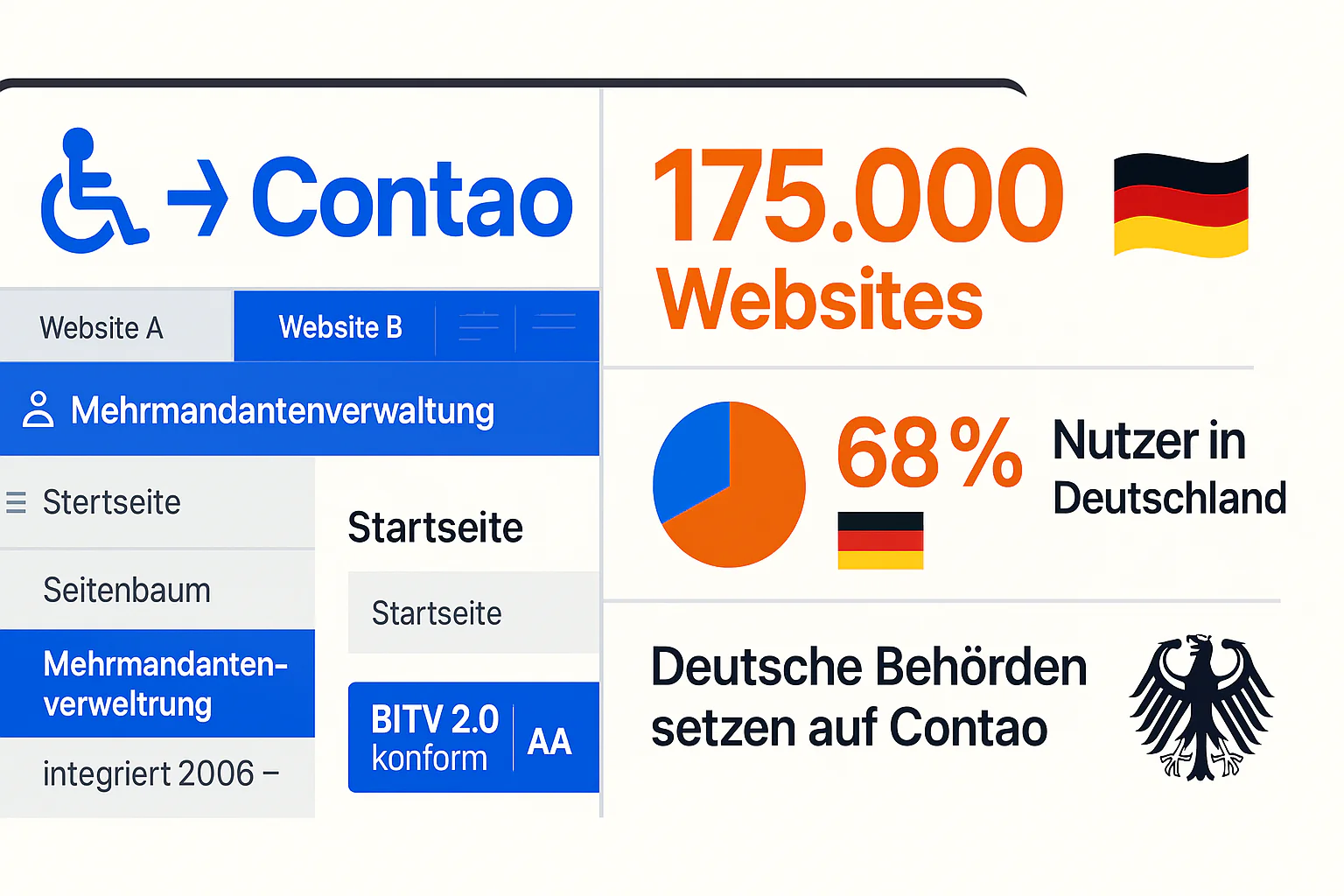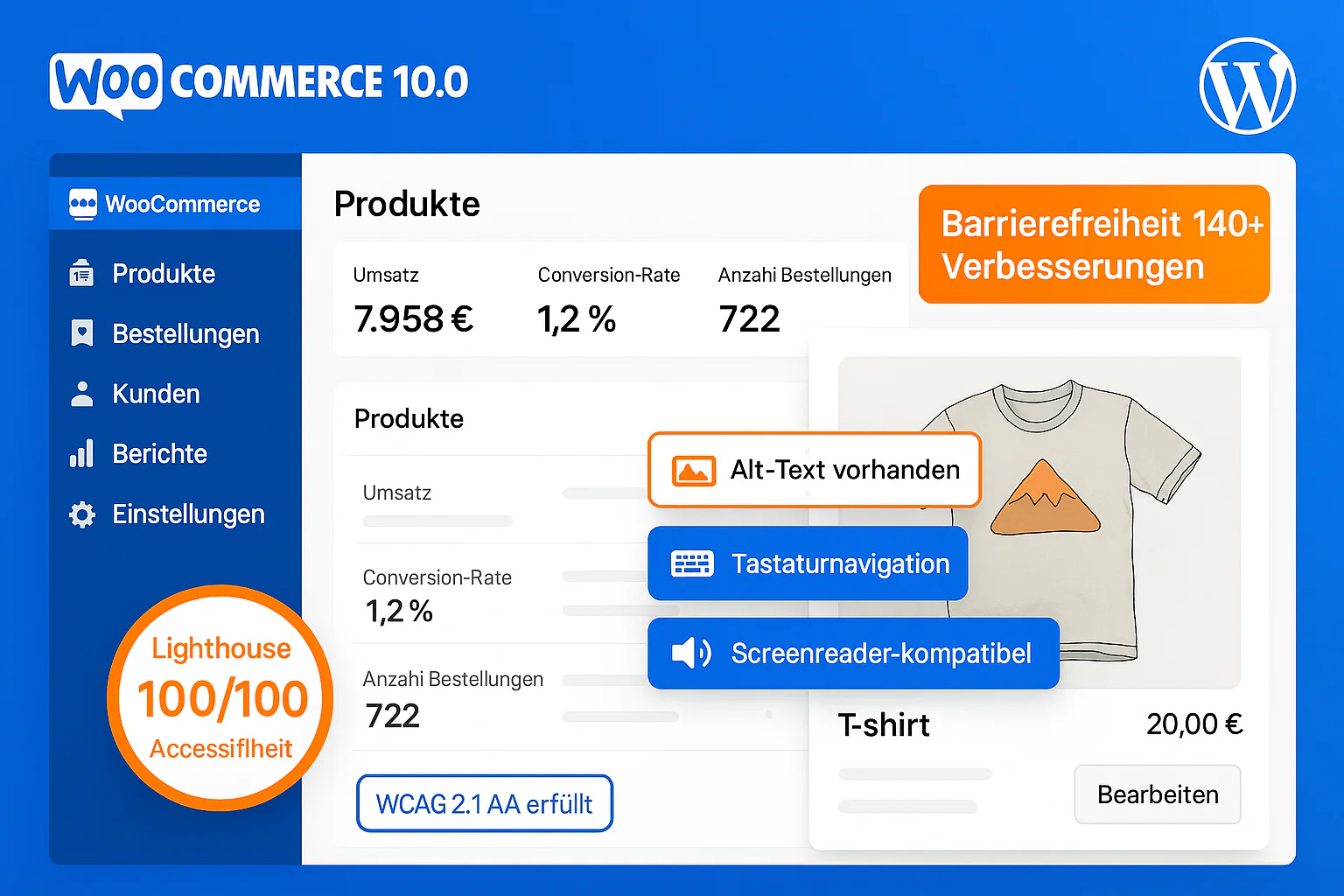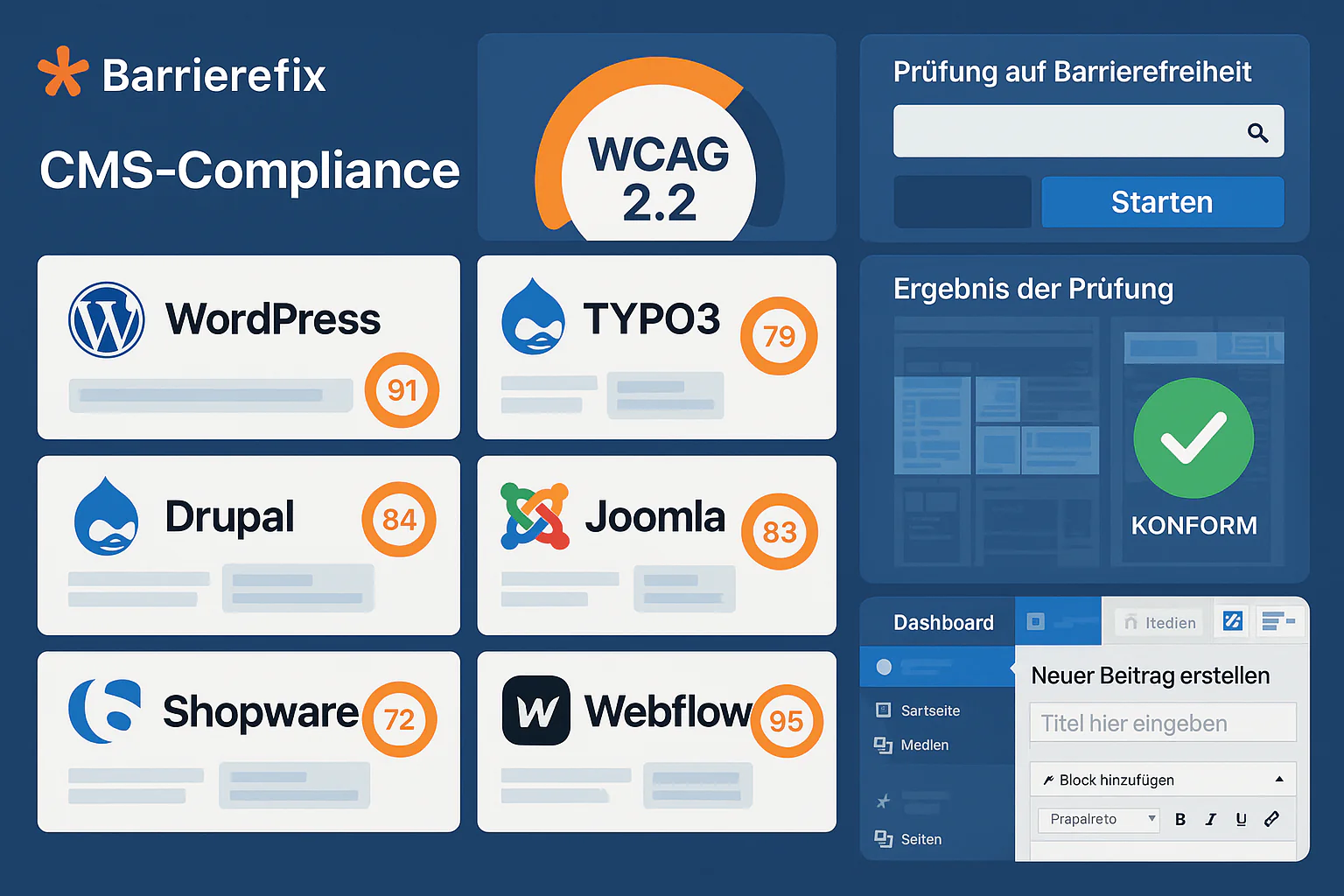Contao CMS BITV Compliance: German Market Leader

Contao CMS accessibility features dominate German digital landscape
Contao CMS has established itself as a cornerstone of accessible web development in Germany, with 68% of its global user base concentrated in the German market and native BITV 2.0 compliance built into its core architecture since 2006. The platform's German origins, founded by Munich developer Leo Feyer, combined with its accessibility-first philosophy and comprehensive support for German regulatory requirements, have made it the preferred choice for over 175,000 websites worldwide, particularly among German agencies handling government and enterprise accessibility projects.
The CMS's success stems from its fundamental design principle of generating accessible, standards-compliant HTML5 code by default, eliminating the need for extensive retrofitting that competitors require. This native approach to accessibility, coupled with predictable 4-year Long Term Support cycles essential for German procurement processes, has positioned Contao as the practical choice for organizations navigating Germany's stringent digital accessibility landscape, including the upcoming European Accessibility Act requirements effective June 2025.
Kostenlose Beratung sichern
Lassen Sie uns über Ihre Website-Barrierefreiheit sprechen
Jetzt Termin vereinbarenBuilt-in accessibility elevates BITV compliance beyond basic standards
Contao's accessibility architecture transcends typical CMS offerings through its comprehensive implementation of BITV 2.0 (Barrierefreie-Informationstechnik-Verordnung) requirements at the core level. The platform generates W3C/WAI-compliant markup automatically, incorporating semantic HTML5 structures, complete keyboard navigation throughout backend and frontend interfaces, and optimized screen reader support with properly maintained heading hierarchies and form label associations. This technical foundation enabled the German Federal Institute for Risk Assessment (BfR) to achieve 90.25/100 points in official BITV testing using Contao.
The system's progressive enhancement of ARIA implementation demonstrates its evolution: Contao 4.5.0-beta3 introduced landmarks and ARIA roles in December 2017, while version 5.4 in 2024 added definable ARIA labels in navigation modules. The platform uniquely addresses German-specific requirements through native support for Deutsche Gebärdensprache (German Sign Language) content integration and Leichte Sprache (Easy Language) templates, both mandatory for BITV compliance. Multi-language accessibility features extend beyond translation, incorporating language-specific accessibility attributes and automatic sitemap generation optimized for assistive technologies.
Form generation capabilities exemplify Contao's accessibility depth, with automatic ARIA attribute implementation for all form fields, proper fieldset and legend structures for radio button groups, and accessible CAPTCHA alternatives including honeypot fields for spam protection. The form generator produces code with keyboard shortcuts, configurable tab indices, and enhanced validation messages that maintain accessibility while ensuring security. Recent updates in Contao 5.5+ added autocomplete support across all form fields, further improving user experience for individuals with motor impairments.
Vergleichen Sie Contao mit anderen CMS-Systemen für Barrierefreiheit in unserem umfassenden Praxis-Guide.
German-focused extension ecosystem addresses regulatory complexity
The Contao extension ecosystem has evolved specifically to meet German regulatory requirements, with over 1,900 extensions available through Packagist, many developed by German agencies for local compliance needs. The All in One Accessibility widget by Skynet Technologies provides 70+ features supporting BITV, EAA EN 301 549, and WCAG 2.1-2.2 standards, offering 140+ language options including German and achieving GDPR, ISO 27001, and ISO 9001 certifications. This comprehensive solution enables 2-minute installation with AI-driven optimization, though organizations typically combine it with manual accessibility improvements for complete compliance.
German developer VT Innovations created Access+ specifically for BFSG (Barrier-Free Digital Services Act) and EAA compliance, featuring automated analysis with manual follow-up requirements for ARIA labels and alt tags. The plugin generates legally-required accessibility declarations automatically and operates with German data processing and hosting, addressing data sovereignty concerns prevalent among German organizations. Installation requires only 15 minutes, making it practical for agencies managing multiple client websites.
Cookie consent solutions demonstrate the ecosystem's DSGVO/GDPR focus, with Oveleon Cookiebar providing self-contained functionality without external scripts, addressing German privacy concerns about third-party dependencies. The solution includes content placeholders for blocked services like YouTube and Google Maps, with service-specific activation buttons maintaining user control. Similarly, Klaro! Consent Manager by pdir GmbH offers pre-configured settings for 20+ popular services, with excludable pages for Impressum and Datenschutz sections, essential for German legal compliance.
The eRecht24 integration (fenepedia/contao-er24-rechtstexte) enables automatic updates of legally-required Impressum and Datenschutzerklärung texts through API integration, supported by multiple prominent German developers including Fritz Michael Gschwantner and DOCKMEDIA. This collaborative development approach, with agencies like Heimrich & Hannot focusing on privacy solutions and Terminal42 providing multilingual accessibility through contao-changelanguage, demonstrates the German developer community's commitment to comprehensive regulatory compliance.
Erfahren Sie mehr über BFSG 2025 Compliance-Anforderungen für deutsche Unternehmen.
Kostenlose Beratung sichern
Lassen Sie uns über Ihre Website-Barrierefreiheit sprechen
Jetzt Termin vereinbarenMulti-site management centralizes accessibility governance
Contao's multi-domain architecture enables organizations to maintain consistent accessibility standards across multiple web properties through a single installation with distinct root pages. Each domain can maintain independent accessibility profiles while sharing core components and widgets, crucial for German organizations managing separate sites for different regions or departments. The configuration allows DNS-based routing where company.de, company.com, and company.at point to different root pages with locale-specific accessibility settings, while maintaining centralized governance of BITV compliance features.
The All in One Accessibility widget supports multi-domain setups through separate licenses or enterprise agreements, enabling organizations to deploy consistent accessibility tools across their entire digital presence. This centralized approach proves particularly valuable for German federal agencies using Contao to manage multiple department websites while ensuring uniform BITV 2.0 compliance. Shared accessibility components can be deployed across all sites in an installation, reducing duplication of effort and ensuring consistency in user experience for individuals using assistive technologies.
Configuration management extends to .htaccess redirects for accessibility compliance, with organizations able to implement domain-specific rules while maintaining core accessibility features. The system's architecture supports different accessibility profiles per domain, accommodating varying regional requirements while maintaining baseline BITV standards. This flexibility enables German multinational corporations to meet both domestic BITV requirements and international WCAG standards through a single CMS installation.
Template development prioritizes semantic markup and progressive enhancement
Contao's template system, transitioning from legacy PHP to Twig in version 5.x, demonstrates sophisticated accessibility implementation through semantic HTML5 generation and comprehensive ARIA support. The framework provides base accessible template structures that automatically incorporate proper heading hierarchies, figure elements with captions, and navigation components with role attributes and aria-labels. Developers can extend these templates while maintaining accessibility compliance through Contao's strict markup validation.
The Twig template architecture enables creation of accessible navigation with aria-current="page" attributes for active items, proper nesting of menu structures, and screen reader-only content through .sr-only classes. Form templates incorporate ARIA live regions for real-time validation feedback, with error summaries linked directly to problematic fields, significantly improving the experience for screen reader users. The system's attrs() function simplifies adding accessibility attributes while maintaining clean, maintainable code.
Bootstrap integration through contao-bootstrap extensions provides pre-configured accessible themes with enhanced focus indicators using 3px solid borders and 2px offsets, exceeding WCAG requirements. Skip navigation links positioned absolutely become visible on focus, while custom SCSS ensures WCAG AA color contrast compliance with specific values like #0056b3 for primary buttons. Responsive image implementation leverages the picture element with multiple source sets, incorporating lazy loading while maintaining alt text requirements. Template organization follows a hierarchical structure separating content elements, frontend modules, and layouts, each with accessibility-specific variants like high_contrast.html.twig and carousel_accessible.html.twig.
The progressive enhancement approach ensures functionality without JavaScript, with fallback URLs and noscript content maintaining accessibility for users with JavaScript disabled. This methodology aligns with German government requirements for robust, universally accessible web services that function across all devices and connection speeds.
Verstehen Sie die BITV vs BFSG Unterschiede zwischen öffentlichen und privaten Anforderungen.
Kostenlose Beratung sichern
Lassen Sie uns über Ihre Website-Barrierefreiheit sprechen
Jetzt Termin vereinbarenForm generator delivers comprehensive accessibility without custom development
Contao's form generator represents a pinnacle of accessible form creation, automatically implementing proper ARIA attributes, fieldset/legend structures, and keyboard navigation without requiring developer intervention. Every form field generates appropriate markup with aria-required="true" for mandatory fields, aria-describedby linking to help text, and invisible spans providing context for screen readers. The system's handling of radio button groups through fieldsets with descriptive legends ensures proper grouping and labeling, critical for BITV compliance.
Error handling incorporates both visual and programmatic indicators, with validation messages appearing in ARIA live regions for immediate screen reader announcement. The form generator creates linked error summaries allowing users to navigate directly to problematic fields, while maintaining focus management throughout the validation process. Security questions replace traditional CAPTCHAs with simple mathematical problems, eliminating barriers for users with visual impairments while maintaining spam protection through honeypot fields hidden from legitimate users.
Advanced features include autocomplete support across all field types (Contao 5.5+), configurable keyboard shortcuts through accesskey attributes, and customizable tab order via tabindex settings. The system validates multiple input patterns including email, URL, and phone numbers, with locale-specific formatting for German phone numbers and postal codes. File upload components enforce alt text requirements and restrict file types, ensuring uploaded content maintains accessibility standards. Range sliders incorporate full ARIA support with proper value announcements, making complex inputs accessible to all users.
Custom form widgets can extend the base Widget class while maintaining accessibility compliance through mandatory blnForAttribute and ARIA attribute generation. This extensibility enables developers to create specialized form components for German-specific requirements like IBAN validation or Umsatzsteuer-ID verification while preserving accessibility features.
Content management workflows enforce accessibility standards systematically
Contao's content management system embeds accessibility requirements directly into editorial workflows, making alt text mandatory for all images and validating heading hierarchies to prevent structure violations. The system throws exceptions when editors attempt to skip heading levels, ensuring documents maintain logical structure essential for screen reader navigation. Link text validation prevents generic phrases like "click here" or "hier klicken," enforcing descriptive link text that provides context without surrounding content.
The TinyMCE rich text editor configuration includes a11ychecker plugins with German language support, providing real-time accessibility warnings as content is created. The accessibility toolbar features dedicated a11ycheck buttons alongside standard formatting options, while configuration settings enable decorative image designation and HTML5 validation. Custom validation hooks process form submissions to verify alt text presence and heading structure compliance, with German-language error messages guiding editors toward compliance.
Content validation extends beyond individual elements to page-level accessibility, with the system checking for proper language attributes, unique page titles, and consistent navigation structures. The All in One Accessibility widget configuration enables features like screen reading, keyboard navigation, voice navigation, high contrast modes, text spacing adjustments, and font sizing controls, all manageable through Contao's backend interface. These tools provide immediate feedback to content editors while maintaining editorial efficiency.
Accessibility checking integrates with Contao's versioning system, allowing organizations to track accessibility improvements over time and identify patterns of non-compliance. The workflow supports accessibility statements required by BITV, with templates automatically populating compliance levels, contact information, and feedback mechanisms. This systematic approach to content accessibility ensures organizations maintain compliance across hundreds or thousands of pages without manual oversight.
Contao versus TYPO3 reveals distinct German market positioning
The comparison between Contao and TYPO3 for accessibility-focused projects reveals fundamental differences in market positioning and technical approach within Germany's digital landscape. TYPO3 dominates the enterprise sector with 77.29% of its enterprise customers based in Germany and powers the federal Government Site Builder (GSB 11) serving 550+ websites across 100+ authorities following a €108 million investment. Its BIK-BITV certified Bootstrap Package and proven compatibility with JAWS screen readers and Braille displays has established TYPO3 as the standard for large-scale government implementations.
Contao's strength lies in its lower complexity and faster implementation for small-to-medium accessibility projects, requiring less specialized expertise while maintaining BITV 2.0 compliance. The total cost of ownership favors Contao for organizations under 50 employees, which comprise 68% of its user base, through reduced development time, efficient hosting requirements, and streamlined maintenance. While TYPO3's 8,100+ extensions dwarf Contao's 1,500+, Contao's focused ecosystem provides higher-quality accessibility solutions specifically tailored to German requirements without the overhead of enterprise features.
TYPO3 excels in complex multilingual and multisite scenarios, with 53.3% of German universities choosing it for extensive customization capabilities and long-term scalability. Baden-Württemberg's consolidation of 16 government websites saved over €6 million in licensing costs, demonstrating TYPO3's value for large-scale migrations. However, Contao's implementation at treppen.de and Austria's digitalbarrierefrei.at portal showcase its effectiveness for focused accessibility projects requiring WCAG 2.2 compliance without enterprise complexity.
The platforms serve complementary market segments: TYPO3 for organizations requiring extensive customization, complex workflows, and enterprise-scale features; Contao for those prioritizing rapid accessibility compliance, user-friendly interfaces, and cost-effective implementation. Both support the upcoming European Accessibility Act requirements, but Contao's built-in compliance and lower barrier to entry make it particularly attractive for the numerous German SMEs facing new accessibility obligations in 2025.
Lesen Sie unseren TYPO3 Barrierefreie News Guide für Enterprise-Anforderungen.
Fazit: Contao als praktische Wahl für deutsche Barrierefreiheit
Contao CMS has evolved into a sophisticated accessibility platform uniquely positioned for the German market through its native BITV compliance, comprehensive extension ecosystem addressing German regulations, and practical implementation approaches that balance technical capability with usability. The platform's accessibility-first architecture, established in 2006 and continuously refined through community-driven development, provides organizations with tools to meet current BITV 2.0 requirements while preparing for evolving European standards. Its template system, form generator, and content management workflows demonstrate how accessibility can be embedded into every aspect of web development without sacrificing efficiency or requiring extensive technical expertise.
The ecosystem of German-developed extensions, from GDPR-compliant cookie management to automated legal text integration, reflects deep understanding of local regulatory requirements that international platforms struggle to match. Multi-site management capabilities with centralized accessibility governance, combined with lower total cost of ownership compared to enterprise alternatives, position Contao as the practical choice for German organizations seeking comprehensive accessibility compliance without the complexity and expense of larger systems. For German agencies, corporations, and institutions navigating the intersection of accessibility requirements, data sovereignty concerns, and budget constraints, Contao provides a proven path to digital inclusion that aligns with both current regulations and future accessibility mandates.
Bereit für Contao CMS Barrierefreiheit? Unsere deutschen CMS-Experten implementieren vollständige BITV 2.0 und BFSG-Compliance für Ihre Contao-Website.
Kostenlose Beratung sichern
Lassen Sie uns über Ihre Website-Barrierefreiheit sprechen
Jetzt Termin vereinbarenKostenloses Audit Ihrer Website
Lassen Sie uns Ihre Website auf Barrierefreiheit prüfen – kostenlos und unverbindlich
Themen:
CMS-ClusterVertiefen Sie Ihr Wissen
Weitere Artikel

Shopware 6 Barrierefreiheit: EAA Compliance Guide für E-Commerce
Shopware 6.7 Accessibility Guide 2025: Built-in WCAG 2.1 Features, EAA Compliance, B2B Features - Perfect 100/100 Lighthouse Score erreichen.

WordPress Barrierefreie Produktseite: WooCommerce WCAG Guide
WooCommerce 10.0 WCAG 2.2 Compliance Guide 2025: Themes, Plugins, Checkout, Payment Gateways - 140+ Accessibility Features richtig konfigurieren.

Barrierefreiheit für alle CMS-Systeme: Der Praxis-Guide
Kompletter CMS-Barrierefreiheit-Vergleich 2025: WordPress, TYPO3, Drupal, Joomla, Contao. WCAG-Compliance, Kosten, Plugin-Ökosystem und BFSG-Readiness für deutsche Unternehmen.